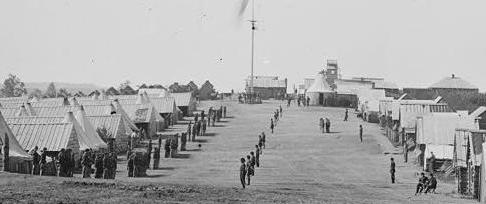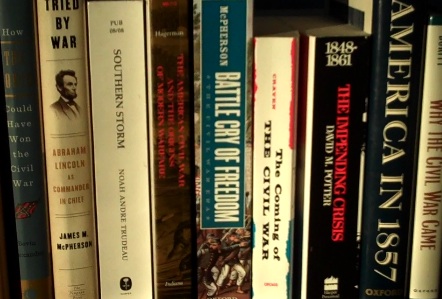Military History Word of the Day – “Castrametation”

Photo: Prospect Hill, Virginia. Camp of the 13th Regiment New York Cavalry. (“Seymour Light”)
[Library of Congress, CALL NUMBER: LC-B817- 7218]
While researching the influence of Jomini on the conduct of the American Civil War, I ran across an article by James L. Morrison, Jr., (Professor, History, Emeritus, York College of Pennsylvania) titled, “Educating the Civil War Generals: West Point, 1833 – 1861” which appeared in Military Affairs. He outlines the curriculum for students who would have made up a large part of the war’s leadership. It was heavily skewed toward science and engineering. But the courses on the study of the science of war included the following topics:
-
“army organization
-
order of battle
- castrametation [misspelled in the text as castramentation]
-
reconnaissance
-
outpost duties
-
attack and defense, and
-
the principles of strategy.”[i]
Castrametation caught my eye. Webster provides some insight into the origins of the word.
“\Cas`tra*me*ta”tion\, n. [F. castram[‘e]tation, fr. L. castra camp + metari to measure off, fr. meta limit.] (Mil.) The art or act of encamping; the making or laying out of a camp.” [ii]
A Military Dictionary and Gazetteer (first published in 1881 under title: A military and naval encyclopedia and available on Google Books here), puts a slightly different spin on it with the following definition:
“Castrametation. Is the art of laying out camps, and of placing the troops so that the different arms of the service shall afford support to each other in the best manner.”[iii]
I have added as a new word to “the terms” page here.
—-
[i] James L. Morrison, Jr., “Educating the Civil War Generals: West Point, 1833 – 1861,” Military Affairs, Vol. 38, No. 3. (Oct., 1974), pp. 109.
[ii] Castrametation. Dictionary.com. Webster’s Revised Unabridged Dictionary. MICRA, Inc. http://dictionary.reference.com/browse/Castrametation (accessed: March 23, 2008).
[iii] Thomas Wilhelm, Military Art and Science, (L. R. Hamersly & co.: 1881) http://books.google.com/books?id=GHcrAAAAMAAJ&pg=PA95&lpg=PA95&dq=what+is+the+history+of+the+word+castrametation%3F&source=web&ots=vnQF5eKGfo&sig=evmHB_wX1onpWxy-eQ9bsZHkZFc&hl=en (accessed online March 21, 2008).
Written by Rene Tyree
March 23, 2008 at 10:13 pm
Posted in American Civil War, Jomini, Military History, West Point
Tagged with 13th Regiment New York Cavalry, American Civil War, Castrametation, James L. Morrison, Jomini, Jr., Military Affairs, Military History, military strategy, Prospect Hill, Science of war, Virginia, West Point, Word of the Day, York College of Pennsylvania
10 Responses
Subscribe to comments with RSS.















































Rene,
Great term! I’d never heard of it before, but it certainly makes sense as a topic of instruction for professional officers.
Don
March 24, 2008 at 3:35 pm
Don,
Thanks for the comment… Have to admit it was a new one for me too.
Rene
Rene Tyree
March 24, 2008 at 5:54 pm
Rene,
Thanks, I’ll have to use this word somewhere in my review of “Huts and History”, an archaeology study of CW camps. As a guy, the word sounds more painful than it really is!
Drew W.
March 24, 2008 at 6:51 pm
Drew,
Castramentation would be perfect for “Huts and History” (which sounds like a great book by the way). You might be interested in the following….Roman Republican Castrametation: A Reappraisal of Historical and Archaeological Sources by John Salvatore. Different era but similar usage.
It also seems to be used by reenactment groups but those focusing on 18th century military groups/events both in Europe and the American Revolution.
And YES, it’s meaning is quite different from what comes immediately to mind! LOL
Rene
Rene Tyree
March 25, 2008 at 9:16 pm
I came across “castramentation” while doing research for my dissertation and had googled the term several times before. It turned up in a 1911 article by an Army officer describing his Wyoming Plan for military training in high schools. My dissertation was accepted without me or any reader knowing what it meant–maybe I was the only one who read it word for word. Thanks for letting me know what it means.
Roger
Roger Possner
May 7, 2008 at 12:32 pm
Roger,
Thanks for the note! Glad it solved the mystery.
Would love to read your dissertation some time.
Rene
Rene Tyree
May 7, 2008 at 1:21 pm
The word is also used quite offten in Mahan’s “An Elementary Treatise on Advanced-Guard, Out-Post, and Detachment Service of Troops”.
caswain01
May 8, 2008 at 7:24 am
Thanks for the information about castramentation in Mahan. Now that’s a book I’ve got to get! I’m just now reading about Mahan’s contribution to tactics and entrenchment in Hagerman’s book which I dig!!
Rene
Rene Tyree
May 9, 2008 at 4:19 pm
Great term! I am currently reading Hannibal written by Theodore Ayrault Dodge. I have not come across this word in all my studies of ancient roman warfare. Thanks again!
Melanie
June 2, 2009 at 5:13 pm
Hi Melanie.
I thought it a great term as well. You’ll have to let me know what you think of Hannibal!
Take care,
Rene
Rene Tyree
June 13, 2009 at 7:40 pm